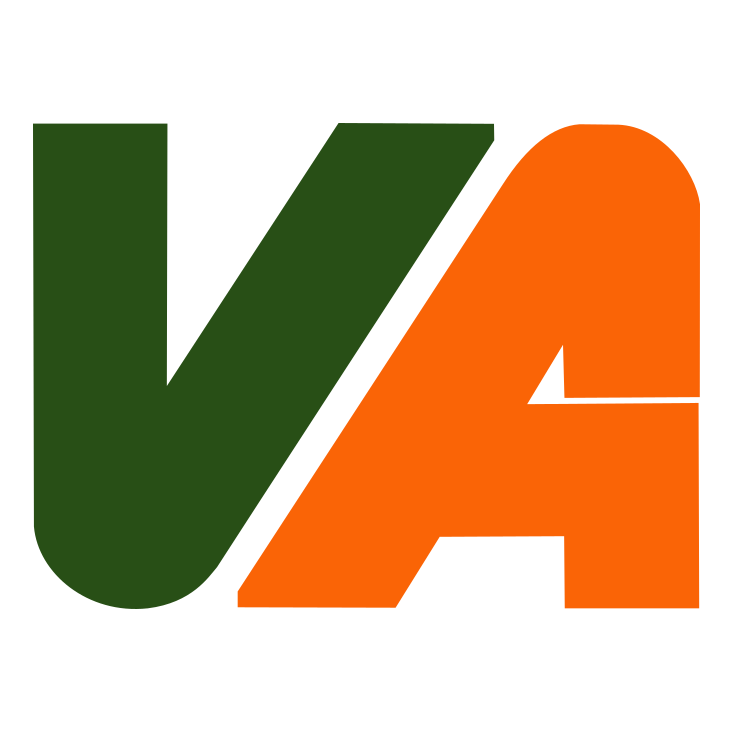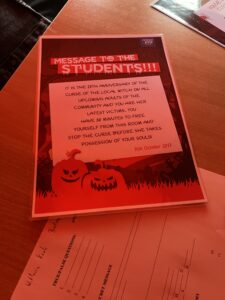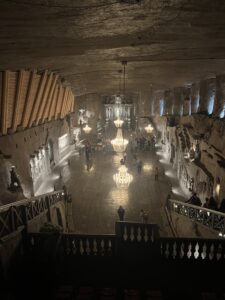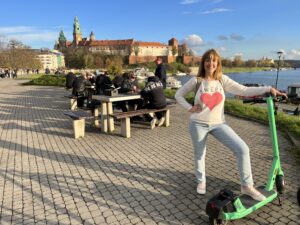What’s up? It’s been my fifth day in Krakow but my third attending classes. Here we go:
- Educational Assembly: My 3rd day in the school started with an enriching activity that connected the High-School(teachers & students) and the local government, all made using Polish language. They explained to me that the last week they attended to a lecture about citizenship and how to be part of the society and now, they were about to discuss and make some proposals about certain aspects, putting in practice some theory. In the gym, they put together some classes, forming a U-shape with all students sitting down among several benches. In the center of the U, there were a couple of tables and chairs, where the local government was represented; one teacher, and two local authorities (councilors). It was time for the students to be listened to. They expressed themselves respectfully and quietly about:
- Education, one of the benches of the U-Shaped assembly, was responsible for education issues. They claimed that there is a lack of sexual education in their curriculum. In addition, they asked for more support in emotional and mental issues, so they reckoned that teachers should be more prepared in these necessities. After their proposals, it was time for the local government representative to talk about. They argued that sexual education in the curriculum was not one of the local competences since it depended on politicians and legislators on a higher level of the administration.
- Infrastructure, was represented by other sector of the U shaped assembly, they argued for better transport links, more cycles lanes, cheaper transport tickets for young people, more green and sportive areas in the city. They even talked about the specific problem they were suffering with 11th line’s tram. Moreover, They wanted facades of buildings to be refurbished as well as pavement which, according to them, it needed to be fixed. Counselor responded to them, saying that there is a lack of economic resources, however, she would pay attention to them. But in the facade’s issue, it was impossible for them since buildings were owned by private individuals, so that, owners were the responsible for it. Furthermore, they were not able to make new sportive areas in the city since there was not available space to do it and if there was, in Krakow it is too unaffordable for the local institution.
- Rule of law, students in the last bench in the U-Shaped assembly claimed for transparency within the public money, and being more concerned about green zone of transport (no diesel cars are allowed to circulate on it). The local government answered supporting them, arguing the terrible smog problem they had.
The meeting was closed with a sum-up reflection by the teacher, saying the importance of being a good citizen for themselves and the whole community.
- Museum: Jacek invited me to visit the nearest museum with some students between 14-15. They have had assigned some tasks in order to make an oral presentation for the following weeks. It let me know more things about history os the district of the other side os Vistula river while I planned in my mind a tour guide through the city, cause, I realized that I was hungering after historical knowledge about Krakow.

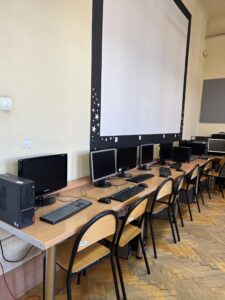
- IT class: It took place in the IT Lab, a big room with more than 21 computers, a projector, an enormous TV, own printer, and plenty of desks at the center to more regular o theorical classes. There were 10 students who worked individually. It started with some tasks printed by the teacher for the students. They were the oldest students in the High-school so they were preparing their “mature exam” or University access exam. Although, IT is not a compulsory subject, it was important for those which wanted to enroll in some scientific universities. I asked the teacher about how many hours did they have, she told me that IT took 3hour per week. I saw that They were using word text processor, then I asked her if it was a free edition or if the government/school institution provided them with original licenses. Her answered that they used official Microsoft Licenses paid for the school. Another interesting program they usually use is GIMP, one of the most complete one.
- Peer English classes: that’s been a very interesting activity. I was told that in order to improve English skill among teachers, English teacher gives Classe with them, only four of us per class with one English teacher. We talked nicely about both educational system, Polish and Spanish one. I learnt many things such as: they took University access exam in the High School instead of University as we do. They did not have any program similar to our «diversifación» or «PMAR», they finished primary school at 14 years, instead of 11 years old as we do. However we shared some things for example: tons of paper work and educational inspectors inquires.
¿Qué pasa? Ha sido mi quinto día en Cracovia pero el tercero asistiendo a clases. Aquí vamos:
Asamblea Educativa: Mi tercer día en la escuela comenzó con una actividad enriquecedora que conectó la escuela secundaria (profesores y estudiantes) y el gobierno local, todo hecho en idioma polaco. Me explicaron que la semana pasada asistieron a una charla sobre ciudadanía y cómo formar parte de la sociedad y que ahora iban a debatir y hacer algunas propuestas sobre ciertos aspectos, poniendo en práctica algo de teoría. En el gimnasio, se juntaron algunas clases, formando una U con todos los alumnos sentados entre varios bancos. En el centro de la U, había un par de mesas y sillas, donde estaba representado el gobierno local; un profesor y dos autoridades locales (concejales). Era el momento de escuchar a los estudiantes. Se expresaron respetuosamente y en voz baja sobre:
Educación, uno de los bancos de la asamblea en forma de U, era el responsable de los temas de educación. Reclamaron la falta de educación sexual en sus planes de estudio. Además, pidieron más apoyo en temas emocionales y mentales, por lo que consideraron que los profesores deberían estar más preparados en estas necesidades. Después de sus propuestas, llegó el turno del representante del gobierno local. Argumentaron que la educación sexual en el currículo no era una de las competencias locales ya que dependía de los políticos y legisladores de un nivel superior de la administración.
La infraestructura, estuvo representada por otro sector de la asamblea en forma de U, abogaron por mejores conexiones de transporte, más carriles bici, billetes de transporte más baratos para los jóvenes, más zonas verdes y deportivas en la ciudad. Incluso hablaron del problema concreto que sufrían con el tranvía de la línea 11. Además, querían que se renovaran las fachadas de los edificios, así como el pavimento que, según ellos, necesitaba ser arreglado. La consejera les respondió diciendo que hay falta de recursos económicos, sin embargo, les prestará atención. Pero en el tema de la fachada, les era imposible ya que los edificios eran propiedad de particulares, por lo que, los propietarios eran los responsables de la misma. Además, no podían hacer nuevas zonas deportivas en la ciudad ya que no había espacio disponible para ello y si lo había, en Cracovia es demasiado inasequible para la institución local.
Estado de derecho, los estudiantes en el último banco de la asamblea en forma de U reclamaron transparencia en el dinero público, y estar más preocupados por la zona verde de transporte (no se permite la circulación de coches diesel en ella). El gobierno local respondió apoyándolos, argumentando el terrible problema de contaminación atmosférica que tenían.
La reunión se cerró con una reflexión resumida del profesor, diciendo la importancia de ser un buen ciudadano para ellos mismos y para toda la comunidad.
Museo: Jacek me invitó a visitar el museo más cercano con algunos alumnos de entre 14 y 15 años. Les habían asignado algunas tareas para hacer una presentación oral en las semanas siguientes. Esto me permitió conocer más cosas sobre la historia del distrito del otro lado del río Vístula mientras planeaba en mi mente una ruta turística por la ciudad, porque me di cuenta de que tenía hambre de conocimientos históricos sobre Cracovia.
Clase de informática: Tuvo lugar en el laboratorio de informática, una gran sala con más de 21 ordenadores, un proyector, una enorme televisión, impresora propia, y muchos pupitres en el centro para las clases más tradicionales o teóricas. Había 10 alumnos que trabajaron individualmente. Comenzó con algunas tareas impresas por la profesora para los alumnos. Eran los alumnos más mayores del instituto por lo que estaban preparando su «examen de madurez» o prueba de acceso a la Universidad. Aunque la informática no es una asignatura obligatoria, era importante para los que querían matricularse en algunas universidades científicas. Le pregunté a la profesora cuántas horas tenían, y me dijo que la informática requería 3 horas a la semana. Vi que utilizaban el procesador de textos Word, entonces le pregunté si era una edición libre o si la institución gubernamental/escolar les proporcionaba licencias originales. Su respuesta fue que utilizaban licencias oficiales de Microsoft pagadas por la escuela. Otro programa interesante que suelen utilizar es GIMP, uno de los más completos.
Clases de inglés entre compañeros: ha sido una actividad muy interesante. Me han dicho que para mejorar el nivel de inglés entre los profesores, el profesor de inglés da clases con ellos, sólo cuatro de nosotros por clase con un profesor de inglés. Hablamos muy bien de los dos sistemas educativos, el polaco y el español. Aprendí muchas cosas, como por ejemplo que ellos hacían el examen de acceso a la universidad en el instituto en lugar de la universidad como nosotros. No tienen ningún programa similar a nuestra «diversificación» o «PMAR», terminan la escuela primaria a los 14 años, en lugar de los 11 años como nosotros. Sin embargo, compartimos algunas cosas, por ejemplo: toneladas de papeleo e investigaciones de los inspectores educativos.
